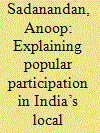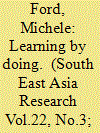| Srl | Item |
| 1 |
ID:
153413


|
|
|
|
|
| Summary/Abstract |
The 73rd amendment to the Indian Constitution launched an extensive experiment in local democracy. Based on a study of 2,794 gram panchayats and field observations in West Bengal, this article examines when and why popular participation in panchayat elections—the most basic and visible aspect of local democracy—differs across local governments. The study finds that gram panchayats witness high levels of participation when they pursue policies that benefit the villagers, such as greater investment in education, and when they are seemingly less corrupt. Investment in public goods and lower rents are known to promote economic development and general welfare. In addition to these familiar implications, this study shows how these policies also have political consequences for democracy in India.
|
|
|
|
|
|
|
|
|
|
|
|
|
|
|
|
| 2 |
ID:
135005


|
|
|
|
|
| Summary/Abstract |
Academic studies of local politics in post-Suharto Indonesia focus on the emergence of coalitions between parties and candidates, arguing that the entrenched and dominant role of political elites has effectively excluded non-elite interests from the electoral arena. The question, then, given the very real and serious obstacles to popular participation, is: what possibility is there for non-elite actors to engage in a meaningful way in electoral politics? One example of an attempt at such engagement can be found in the industrial city of Batam, where the local branch of the Federation of Indonesian Metalworkers Unions set up a purpose-specific structure to promote the political interests of its members in successive local executive and legislative elections. This paper argues that, despite the ultimate failure of the union's electoral experiments between 2004 and 2009, the process of 'learning by doing' embedded in them presents a significant challenge to analyses that discount the possibility of substantive popular participation in electoral politics.
|
|
|
|
|
|
|
|
|
|
|
|
|
|
|
|
| 3 |
ID:
146889


|
|
|
|
|
| Summary/Abstract |
In the last five years China has passed new regulations and formulated new policies to target urban smog. Accordingly, several cities have sought to improve their public transportation systems to reduce the number of motor vehicles on the streets. In 2011 in Nanjing, during the construction of Line No. 3 of the subway system, several long-standing London plane trees in the city’s historical area were targeted for transplantation. This article focuses on the tree-hugging protest which was triggered by this event in 2011–12. While protesters framed their actions as tree protection and heritage conservation, this article is particularly interested in participatory approaches available to protesters, in light of certain recent developments in the environmental regulatory framework in China. Specifically, this article analyses a relatively new and less well-known tool for popular participation known as ‘green assessment’.
|
|
|
|
|
|
|
|
|
|
|
|
|
|
|
|